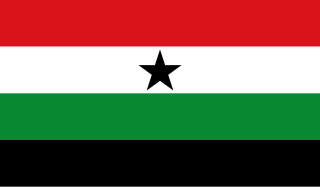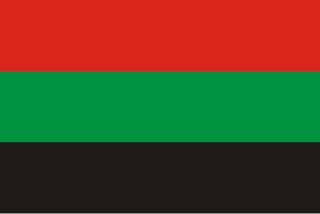Related Research Articles

The Derg, officially the Provisional Military Administrative Council (PMAC), was the Marxist–Leninist military dictatorship that ruled Ethiopia, then including present-day Eritrea, from 1974 to 1987, when the military leadership or junta formally "civilianized" the administration but stayed in power until 1991.

The Gambela Region, officially the Gambela Peoples' Region, is a regional state in western Ethiopia, bordering South Sudan. Previously known as Region 12, its capital is Gambela. The Region is situated between the Baro and Akobo Rivers, with its western part including the Baro River.

Gambela, also spelled Gambella, is a city and separate woreda in Ethiopia and the capital of the Gambela Region. Located in Anyuak Zone, at the confluence of the Baro River and its tributary the Jajjabe, the city has a latitude and longitude of 8°15′N34°35′E and an elevation of 526 meters. It is surrounded by Gambella Zuria.

The Anyuak, also known as Anyuaa and Anywaa, are a Luo Nilotic ethnic group inhabiting parts of East Africa. The Anuak belong to the larger Luo family group. Their language is referred to as Dha-Anywaa. They primarily reside in the Gambela Region of western Ethiopia, and South Sudan. Group members number between 200,000 and 300,000 people worldwide. Many of the Anyuak people now follow Christianity. It is one of the first of the Nilotic groups to become almost entirely Christian, following the Shilluk people.
Gambella National Park, also spelled Gambela National Park, is a 5,016 km2 (1,937 sq mi) large national park in Ethiopia. It is the nation's largest national park and is located several hundred kilometers from Addis Ababa. It was established in 1974, but is not fully protected and has not been effectively managed for much of its history.

The Gambela Peoples’ Democratic Movement, also known as the Gambela People’s Democratic Movement or Gambella Peoples’ Unity Democratic Movement, was a political party in the Gambela Region of Ethiopia. It was the regional ally of the ruling EPRDF coalition.

According to the U.S. Department of State's human rights report for 2022, there exists "significant human rights issues" in Ethiopia. In addition to extrajudicial killings and instances of "enforced disappearance", other human right issues in Ethiopia include arbitrary arrest, the censorship and unjustified arrests of journalists, the use of child soldiers, and more.
Abwobo is a woreda in Gambela Region, Ethiopia. Part of the Anywaa Zone, Abwobo is bordered on the southeast by the Majang Zone, on the south by Gog, on the southwest by Jor, on the northwest by Itang special woreda, on the north by Gambela Zuria, and on the northeast by the Oromia Region; part of its northern boundary is defined by the Alworo River. The major town in Abwobo is Abwobo.
Gog is a woreda in Gambela Region, Ethiopia. Part of the Anuak Zone, Gog is bordered on the south by Dimma, on the southwest by the Akobo River which separates it from South Sudan, on the west by Jor, and on the north by Abobo. The major town in Gog is Fugnido.
Itang is a woreda in Gambela Region, Ethiopia. Because Itang is not part of any zone in the Gambela Region, it is considered a Special woreda, an administrative subdivision which is similar to an autonomous area. It is bordered on the south and southeast by the Anuak Zone, on the west by the Nuer Zone, on the northwest by South Sudan, and on the north by the Oromia Region; part of the southern boundary is defined by the Alwero River. The major town in Itang is Itang.

The Gambela conflict refers to sporadic conflicts in the Gambela Region of Ethiopia between armed groups of the indigenous Anuak people with armed groups of the Nuer people, and the Ethiopian military. Following resettlement policies implemented by the Derg regime in the 1980s, a number of ethnic conflicts have taken place between the Anuak people indigenous to much of the Gambela region, and other groups which were resettled in the region. Following the collapse of the Derg regime, persistent ethnic tensions in the region have occasionally exploded into open conflict. Such conflict erupted in the early to mid 2000s, coinciding with an increase in petroleum extraction in the region, and led to a number of incidents resulting in the large-scale deaths of civilians. The Ethiopian military has intervened to combat Anuak militias.

The 2007–2008 Ethiopian crackdown in Ogaden was a military campaign by the Ethiopian Army against the Ogaden National Liberation Front (ONLF). The crackdown against the guerrillas began after they killed 74 people in an attack on a Chinese-run oil exploration field in April 2007.
The Episcopal/Anglican Province of Alexandria is a province of the Anglican Communion. Its territory was formerly the Diocese of Egypt with North Africa and the Horn of Africa. On 29 June 2020 the diocese was elevated to the status of an ecclesiastical province, and became the forty-first province of the Anglican Communion. The primate and metropolitan of the province is the Archbishop of Alexandria.

The Transitional Government of Ethiopia (TGE) was an era established immediately after the Ethiopian People's Revolutionary Democratic Front (EPRDF) seized power from the Marxist-Leninist People's Democratic Republic of Ethiopia (PDRE) in 1991. During the transitional period, Meles Zenawi served as the president of the TGE while Tamrat Layne was prime minister. Among other major shifts in the country's political institutions, it was under the authority of the TGE that the realignment of provincial boundaries on the basis of ethnolinguistic identity occurred. The TGE was in power until 1995, when it transitioned into the reconstituted Federal Democratic Republic of Ethiopia that remains today.
The Labour League, generally known by its Amharic name Waz or the hybrid name Waz League, was a Marxist organization in Ethiopia active between 1975 and 1979, allied with the Derg military junta. Waz League was founded by Dr. Sennai Likkay, a veteran leader of the student movement.

The Gambela People's Liberation Movement was a rebel group in the Gambela Region in Ethiopia. The GPLM was founded by Anuak dissidents during the Derg and Woyane regime. The organization remained dominated by Anuaks. Agwa Alemu was the chairman of the GPLM.
The Gambela People's Democratic Unity Party was a political party in Gambela Region, Ethiopia. GPDUP was mainly based amongst Nuer people, formed in 1992 in Nasir in the midst of mass displacements of Nuers as the Anuak-dominated Gambela People's Liberation Movement had taken control over Gambela in 1991. GPLM and GPDUP struggled violently against each other for most of the 1990s, until the Addis Ababa government intervened and forced the merger of the two parties into the Gambela People's Democratic Front in 1998.

The Ethiopian Unity Patriots Front is a political party and militant rebel organization that waged an insurgency against the Ethiopian government from 1993 to 2012. Formed by ex-officials of the Derg regime, the EUPF was mostly active in Ethiopia's Gambela Region as well as eastern Sudan and South Sudan. The group agreed to a ceasefire with the Ethiopian government in 2012, and officially ended its insurgency in 2016. The EUPF remains active, however, and its armed wing has reportedly been involved in the South Sudanese Civil War, although to what extent is disputed.
Dead Donkeys Fear No Hyenas, is a 2017 Swedish-Ethiopian documentary thriller film directed by Joakim Demmer and co-produced by Margarete Jangård for WG Film, Heino Deckert for ma.ja.de, and John Webster for JW Documentaries. The film revolves around Farmland, the new green gold in Ethiopia where foreign investors use millions of hectares and dream of prosperity of the local people.
The Gambela Massacre was a three-day-long massacre in the city of Gambela targeting Anuak people in December of 2003. The massacre perpetrated by the ENDF and "highlander" militias after an ambush of ARRA employees. Calls from International community made to condemn and stop the various forms of attacks against the Anuak people- i.e. Ethiopia to take immediate action and to comply to the International Convention on the Elimination of All Forms of Racial Discrimination (“ICERD”). The calls included actions against: 1) Racial Discrimination, 2) State obligation to protect and ensure economic development, economic, social, and cultural rights, 3) Freedom of movement, 4)The right to equal treatment in the justice system, 5) Protection Against Violence, and 6) Access to Remedies and Justice for Crimes of Racial Discrimination.
References
- 1 2 3 4 International Conference of Ethiopian Studies, Katsuyoshi Fukui, Eisei Kurimoto, and Masayoshi Shigeta. Ethiopia in broader perspective: papers of the XIIIth International Conference of Ethiopian Studies, Kyoto, 12-17 December 1997 . Kyoto, Japan: Shokado Book Sellers, 1997. p. 810
- 1 2 3 Grawert, Elke. After the Comprehensive Peace Agreement in Sudan . Oxford [u.a.]: James Currey, 2010. p. 224
- 1 2 3 Feyissa, Dereje. Playing Different Games: The Paradox of Anywaa and Nuer Identification Strategies in the Gambella Region, Ethiopia . New York: Berghahn Books, 2011. p. 140
- 1 2 Human Rights Watch. Targeting the Anuak: human rights violations and crimes against humanity in Ethiopia's Gambella Region . London: Human Rights Watch, 2005. p. 10
- 1 2 Akol, Lam. SPLM/SPLA: The Nasir Declaration . New York: iUniverse, Inc, 2003. pp. 101-102
- ↑ Allen, Tim. In Search of Cool Ground: War, Flight & Homecoming in Northeast Africa . Trenton, NJ [u.a.]: Africa World Press, 1996. p. 198